-
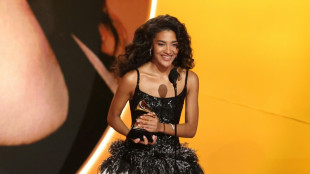 British singer Olivia Dean wins Best New Artist Grammy
British singer Olivia Dean wins Best New Artist Grammy
-
Hatred of losing drives relentless Alcaraz to tennis history
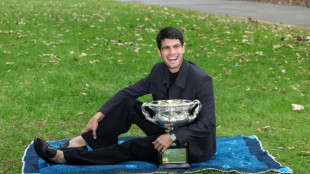
-
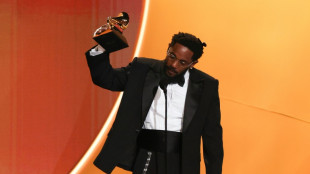 Kendrick Lamar, Bad Bunny, Lady Gaga win early at Grammys
Kendrick Lamar, Bad Bunny, Lady Gaga win early at Grammys
-
Surging euro presents new headache for ECB
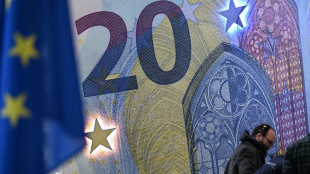
-
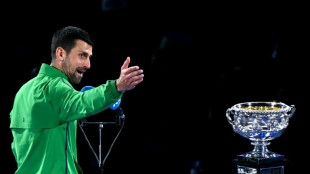 Djokovic hints at retirement as time seeps away on history bid
Djokovic hints at retirement as time seeps away on history bid
-
US talking deal with 'highest people' in Cuba: Trump
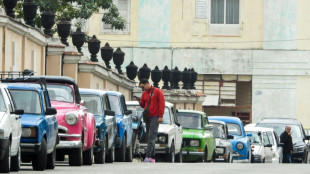
-
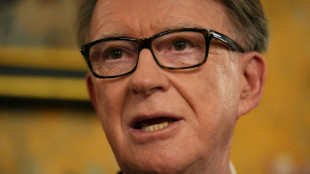 UK ex-ambassador quits Labour over new reports of Epstein links
UK ex-ambassador quits Labour over new reports of Epstein links
-
Trump says closing Kennedy Center arts complex for two years
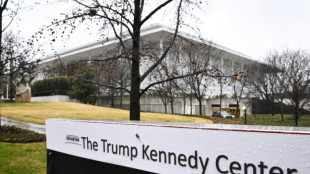
-
 Reigning world champs Tinch, Hocker among Millrose winners
Reigning world champs Tinch, Hocker among Millrose winners
-
Venezuelan activist ends '1,675 days' of suffering in prison

-
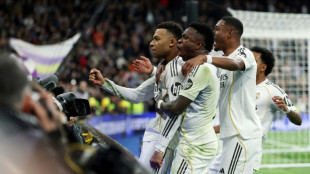 Real Madrid scrape win over Rayo, Athletic claim derby draw
Real Madrid scrape win over Rayo, Athletic claim derby draw
-
PSG beat Strasbourg after Hakimi red to retake top spot in Ligue 1
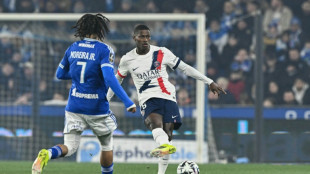
-
 NFL Cardinals hire Rams' assistant LaFleur as head coach
NFL Cardinals hire Rams' assistant LaFleur as head coach
-
Arsenal scoop $2m prize for winning FIFA Women's Champions Cup

-
 Atletico agree deal to sign Lookman from Atalanta
Atletico agree deal to sign Lookman from Atalanta
-
Real Madrid's Bellingham set for month out with hamstring injury

-
 Man City won't surrender in title race: Guardiola
Man City won't surrender in title race: Guardiola
-
Korda captures weather-shortened LPGA season opener

-
 Czechs rally to back president locking horns with government
Czechs rally to back president locking horns with government
-
Prominent Venezuelan activist released after over four years in jail

-
 Emery riled by 'unfair' VAR call as Villa's title hopes fade
Emery riled by 'unfair' VAR call as Villa's title hopes fade
-
Guirassy double helps Dortmund move six points behind Bayern

-
 Nigeria's president pays tribute to Fela Kuti after Grammys Award
Nigeria's president pays tribute to Fela Kuti after Grammys Award
-
Inter eight clear after win at Cremonese marred by fans' flare flinging

-
 England underline World Cup
credentials with series win over Sri Lanka
England underline World Cup
credentials with series win over Sri Lanka
-
Guirassy brace helps Dortmund move six behind Bayern

-
 Man City held by Solanke stunner, Sesko delivers 'best feeling' for Man Utd
Man City held by Solanke stunner, Sesko delivers 'best feeling' for Man Utd
-
'Send Help' debuts atop N.America box office

-
 Ukraine war talks delayed to Wednesday, says Zelensky
Ukraine war talks delayed to Wednesday, says Zelensky
-
Iguanas fall from trees in Florida as icy weather bites southern US

-
 Carrick revels in 'best feeling' after Man Utd leave it late
Carrick revels in 'best feeling' after Man Utd leave it late
-
Olympic chiefs admit 'still work to do' on main ice hockey venue

-
 Pope says Winter Olympics 'rekindle hope' for world peace
Pope says Winter Olympics 'rekindle hope' for world peace
-
Last-gasp Demirovic strike sends Stuttgart fourth

-
 Sesko strikes to rescue Man Utd, Villa beaten by Brentford
Sesko strikes to rescue Man Utd, Villa beaten by Brentford
-
'At least 200' feared dead in DR Congo landslide: government

-
 Coventry says 'sad' about ICE, Wasserman 'distractions' before Olympics
Coventry says 'sad' about ICE, Wasserman 'distractions' before Olympics
-
In-form Lyon make it 10 wins in a row

-
 Man Utd strike late as Carrick extends perfect start in Fulham thriller
Man Utd strike late as Carrick extends perfect start in Fulham thriller
-
Van der Poel romps to record eighth cyclo-cross world title

-
 Mbappe penalty earns Real Madrid late win over nine-man Rayo
Mbappe penalty earns Real Madrid late win over nine-man Rayo
-
Resurgent Pakistan seal T20 sweep of Australia

-
 Fiji top sevens standings after comeback win in Singapore
Fiji top sevens standings after comeback win in Singapore
-
Alcaraz sweeps past Djokovic to win 'dream' Australian Open

-
 Death toll from Swiss New Year bar fire rises to 41
Death toll from Swiss New Year bar fire rises to 41
-
Alcaraz says Nadal inspired him to 'special' Australian Open title

-
 Pakistan seeks out perpetrators after deadly separatist attacks
Pakistan seeks out perpetrators after deadly separatist attacks
-
Ukraine war talks delayed to Wednesday, Zelensky says

-
 Djokovic says 'been a great ride' after Melbourne final loss
Djokovic says 'been a great ride' after Melbourne final loss
-
Von Allmen storms to downhill win in final Olympic tune-up

Iran's nuclear dilemma: peace or war?
Iran faces a dilemma: should it abandon its controversial nuclear programme in order to avoid international sanctions and avert a possible military conflict, or should it continue to insist on its right to peaceful use of nuclear energy, even if this increases the risk of war? This question has preoccupied the international community for years, and tensions have recently risen again.
Iran's nuclear programme began in the 1950s with US support under the ‘Atoms for Peace’ programme. In 1967, another reactor was delivered from the US, and in 1970 Iran ratified the Nuclear Non-Proliferation Treaty (NPT). However, after the Islamic Revolution in 1979, the programme was secretly continued. In 2002, undeclared nuclear activities were discovered, leading to an investigation by the International Atomic Energy Agency (IAEA) and international sanctions.
In 2015, the Joint Comprehensive Plan of Action (JCPOA) was signed, in which Iran committed to limiting its nuclear programme in exchange for the lifting of sanctions. In 2018, the United States withdrew from the agreement under President Trump and imposed new sanctions. Iran then began to exceed the limits set out in the JCPOA.
According to recent IAEA reports, Iran has significantly expanded its uranium enrichment. In February 2025, the country had just under 275 kilograms of uranium enriched to 60 per cent. Experts estimate that Iran is only a few months away from having enough fissile material for a nuclear bomb. According to US officials and IAEA experts, Iran has enough enriched uranium for at least three nuclear bombs and could build a primitive bomb within a few months.
Despite the tensions, efforts are being made to find a diplomatic solution. In April 2025, indirect talks between the US and Iran took place in the Sultanate of Oman. Both sides spoke of a ‘constructive and positive atmosphere’. However, Iran rejects direct negotiations with the US and insists that the US must first lift sanctions. A senior Iranian official, Ali Shamkhani, rejected a US offer to allow Iran to have a civilian nuclear programme similar to that of the UAE, arguing that Iran would not give up its right to enrich uranium. Despite the negotiations, Iran is continuing its uranium enrichment, and planned talks with the US have been cancelled, further increasing tensions.
A nuclear-armed Iran could lead to a nuclear arms race in the Middle East and threaten regional stability. There is also a risk of military conflict, which would have far-reaching consequences. The US and Israel have repeatedly threatened military strikes if Iran does not halt its nuclear programme. Some experts argue that destroying the nuclear facilities would not be enough and that a complete overthrow of the regime would be necessary to eliminate the threat.
Iran could abandon its nuclear programme and in return achieve the lifting of sanctions and a normalisation of relations with the West. Alternatively, it could continue to insist on its right to the peaceful use of nuclear energy, but this would increase the risk of further sanctions and possible military action. The decision will also be influenced by internal factors, such as the precarious economic situation and strong nationalist sentiment in the country.
Iran's nuclear dilemma remains one of the greatest challenges facing the international community. A peaceful solution requires diplomatic skill, a willingness to compromise and the trust of all parties involved. The alternative – military conflict – would be disastrous for all sides.

Who wins and who loses in Syria?

South Korea: Yoon Suk Yeol shocks Nation

Dictator Putin threatens to destroy Kiev

Will Trump's deportations be profitable?

Ishiba's Plan to Change Power in Asia

EU: Online platforms to pay tax?

EU: Energy independence achieved!

EU: Record number of births!

EU: Military spending is on the rise!

Crisis: EU bicycle production drops!

EU: Foreign-controlled enterprises?



